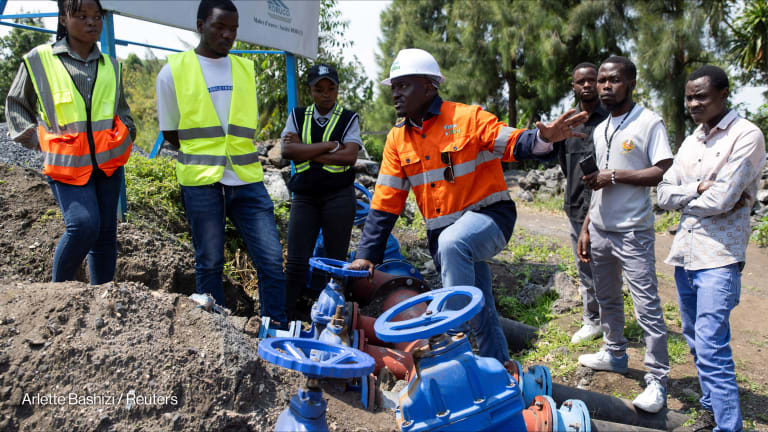Top USAID contract awardees: A primer
The U.S. Agency for International Development’s obligated funding for its top 20 contract awardees in fiscal 2012 accounted for nearly three-quarters of its contract spending that year.
The U.S. Agency for International Development’s obligated funding for its top 20 contract awardees in fiscal 2012 accounted for nearly three-quarters of its contract spending that year. Against the backdrop of ongoing budget pressures in Washington, USAID also recorded a significant increase in its contract spending. USAID awarded more than $4.9 billion in contracts in fiscal 2012 - representing a 9 percent increase from fiscal 2011. While USAID awards the bulk of its contracts to for-profit groups, nongovernmental organizations also win a sizeable chunk of the agency’s contract funding. Since the Clinton administration, USAID has channeled the bulk of its contract assistance through multiyear, umbrella agreements called indefinite quantity contracts. Designed to streamline the U.S. aid agency’s procurement, IQCs allow only pre-qualified firms or nonprofits to bid on a contract. Amid USAID Forward’s push for more competition at the agency, however, USAID officials have indicated that the agency intends to reduce its reliance on IQCs, in part, by awarding more stand-alone contracts. In addition to fostering more competition, bolstering USAID’s engagement with local organizations is another key objective for the USAID Forward reform drive. USAID has pledged to course 30 percent of its overall assistance through country systems — governments, local businesses and local NGOs — by 2015. In fiscal 2012, firms based outside the United States won only 4 percent of USAID contracts. Here are the top 20 USAID contract awardees, based on data from USASpending.gov, for fiscal 2012. 1. Chemonics Founded: 1975 Headquarters: Washington, D.C. President and CEO: Susanna Mudge Obligated USAID contract funding: $653.5 million With more than 3,000 staff worldwide, Chemonics designs and implements projects in a wide range of technical areas including financial services, private sector development, health, and democracy and governance. The international development company has experience working in 145 countries. 2. John Snow Inc. Founded: 1978 Headquarters: Boston, Mass. President: Joel Lamstein Obligated USAID contract funding: $465 million John Snow Inc.’s 500 U.S.-based professionals and 1,600 host country staff provide technical and management assistance to public health initiatives worldwide. Over the past 35 years, JSI has implemented projects in 106 countries. JSI’s nonprofit arm, the JSI Research and Training Institute, is a top USAID grant implementer. 3. Partnership for Supply Chain Management Founded: 2005 Headquarters: Arlington, Va. Obligated USAID contract funding: $429.5 million Counting 13 member organizations, the Partnership for Supply Chain Management procures and distributes essential medicines and supplies for more than 1 million people on treatment through the U.S. President’s Emergency Plan for AIDS Relief. PFSCM was established by the JSI Research and Training Institute, and Management Sciences for Health. 4. Tetra Tech Founded: 1966 Headquarters: Pasadena, Calif. Chairman, CEO, and President: Dan L. Batrack Obligated USAID contract funding: $249.8 million Tetra Tech’s global team of 14,000 professionals provide planning, design, implementation and applied research services in areas including construction, agriculture and economic growth, democracy and governance, energy, and global security. In recent years, Tetra Tech has strengthened its positioning in the aid industry through its acquisition of firms including ARD and DPK, as well as the international development arm of PA Consulting. 5. DAI Founded: 1970 Headquarters: Bethesda, Md. President and CEO: James Boomgard Obligated USAID contract funding: $216.4 million Named a Devex Top 40 Development Innovator in 2011, DAI has expertise in the areas of economic growth, environment and energy, governance, health, ICT, stability as well as in the corporate sector. DAI currently works in some 60 countries across the globe. A joint venture of DAI and Nathan Associates is ranked 15th in this list. 6. Abt Associates Founded: 1965 Headquarters: Cambridge, Mass. President and CEO: Kathleen L. Flanagan Obligated USAID contract funding: $211.8 million With a presence in nearly 40 countries, Abt Associates’ practice areas include education, environment and climate change, food security and agriculture, and international health. Abt Associates was also named a Devex Top 40 Development Innovator in 2011. 7. Black & Veatch Special Projects Corp. Founded: 1988 Headquarters: Overland Park, Kan. Obligated USAID contract funding: $185.7 million Black & Veatch’s approximately 10,000 professional staff provide engineering, consulting and construction services in more than 100 countries worldwide. Black & Veatch affiliate, the Black & Veatch Special Projects Corp., serves the U.S. government market. 8. Creative Associates International Founded: 1977 Headquarters: Washington, D.C. President and CEO: M. Charito Kruvant Obligated USAID contract funding: $153.4 million The second-largest women-owned company working with the U.S. government, Creative Associates International has expertise in education, governance, stabilization and post-conflict transitions. Since its founding, the firm has operated in 85 countries in in Asia, Africa, Latin America, Eastern Europe and the Middle East. 9. AECOM Founded: 1990 Headquarters:Los Angeles, Calif. Chairman and CEO: John M. Dionisio Obligated USAID contract funding: $145.1 million Public policy and economic institutions, democracy and governance, humanitarian response and stabilization, and industrial and commercial area development are among AECOM’s core areas of expertise in its international development practice. One of the leading firms involved in engineering work in global development, AECOM was named a Devex Top 40 Development Innovator in 2011. 10. Louis Berger Group Founded: 1953 Headquarters: Morristown, N.J. Chairman: Fredric S. Berger Obligated USAID contract funding: $138.2 million With nearly 3,000 employees in 35 countries, the Louis Berger Group provides engineering, architecture, program and construction management, environmental planning and science, and economic development services. LBG’s areas of expertise include development economics, energy, public administration, and reconstruction and recovery. 11. Engility (formerly International Resources Group) Headquarters: Chantilly, Va. Obligated USAID contract funding: $102.8 million 12. Deloitte Consulting LLP Headquarters: New York, N.Y. Obligated USAID contract funding: $84.2 million 13. FHI 360 Headquarters: Durham, N.C. Obligated USAID contract funding: $79.8 million 14. Management Systems International Headquarters: Washington, D.C. Obligated USAID contract funding: $76.7 million 15. DAI/Nathan Group Obligated USAID contract funding: $75.8 million 16. RTI International Headquarters: Research Triangle Park, N.C. Obligated USAID contract funding: $72.8 million 17. University Research Co. Headquarters: Bethesda, Md. Obligated USAID contract funding: $67.7 million 18. Management Sciences for Health Headquarters: Cambridge, Mass. Obligated USAID contract funding: $64.7 million 19. Aircraft Charter Solutions Inc. Obligated USAID contract funding: $63.3 million 20. International Relief and Development Headquarters: Arlington, Va. Obligated USAID contract funding: $52.8 million See our 2011 ranking of USAID’s top private sector partners. Check out more funding trends analyses online, and sign up as an Executive Member to receive the information you need for your organization to thrive.
The U.S. Agency for International Development’s obligated funding for its top 20 contract awardees in fiscal 2012 accounted for nearly three-quarters of its contract spending that year. Against the backdrop of ongoing budget pressures in Washington, USAID also recorded a significant increase in its contract spending. USAID awarded more than $4.9 billion in contracts in fiscal 2012 - representing a 9 percent increase from fiscal 2011. While USAID awards the bulk of its contracts to for-profit groups, nongovernmental organizations also win a sizeable chunk of the agency’s contract funding.
Since the Clinton administration, USAID has channeled the bulk of its contract assistance through multiyear, umbrella agreements called indefinite quantity contracts. Designed to streamline the U.S. aid agency’s procurement, IQCs allow only pre-qualified firms or nonprofits to bid on a contract. Amid USAID Forward’s push for more competition at the agency, however, USAID officials have indicated that the agency intends to reduce its reliance on IQCs, in part, by awarding more stand-alone contracts.
In addition to fostering more competition, bolstering USAID’s engagement with local organizations is another key objective for the USAID Forward reform drive. USAID has pledged to course 30 percent of its overall assistance through country systems — governments, local businesses and local NGOs — by 2015. In fiscal 2012, firms based outside the United States won only 4 percent of USAID contracts.
This story is forDevex Promembers
Unlock this story now with a 15-day free trial of Devex Pro.
With a Devex Pro subscription you'll get access to deeper analysis and exclusive insights from our reporters and analysts.
Start my free trialRequest a group subscription Printing articles to share with others is a breach of our terms and conditions and copyright policy. Please use the sharing options on the left side of the article. Devex Pro members may share up to 10 articles per month using the Pro share tool ( ).
Lorenzo is a former contributing analyst for Devex. Previously Devex's senior analyst for development finance in Manila.








